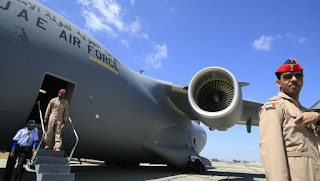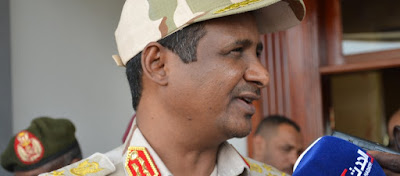Article from The Telegraph.co.uk
By NICK ALLEN, Washington
Date: Wednesday, 31 July 2019 8:58PM
US ‘has intelligence Hamza bin Laden is dead’
The United States has received intelligence that Hamza bin Laden, the son and possible successor of the former al-Qaeda leader Osama bin Laden, is dead, according to reports.
There were no details of how, or where, the reported death occurred, or whether the US had itself confirmed the information, NBC News reported.
Asked whether Hamza bin Laden was dead, Donald Trump, the US president, said: "I don’t want to comment on it. I don’t want to comment on that."
Three US officials confirmed the intelligence had been obtained, but gave no details of whether the US was involved in causing Hamza bin Laden's death, NBC News reported.
Five months ago the US state department announced a $1 million reward for information on his location, and described Hamza bin Laden, who is aged about 30, as an "emerging al-Qaeda leader."
In a statement at the time the US government added: "He has released audio and video messages on the internet, calling on his followers to launch attacks against the United States and its Western allies, and he has threatened attacks against the United States in revenge for the May 2011 killing of his father by US military forces."
Osama bin Laden was shot dead by US Navy Seals in May 2011 in a raid on his compound in Abbottabad, Pakistan. Hamza bin Laden was not discovered at the compound.
He is believed to have been the 15th of Osama bin Laden's roughly 20 children.
Hamza bin Laden spent his early childhood with his parents in Saudi Arabia, Sudan and Afghanistan.
Following the September 11, 2001 terror attacks he was sent to Iran.
After his father's death he became known as the Crown Prince of Jihad, calling for jihadists to unite, and for the overthrow of the Saudi royal family.
In one of the recordings he released after his father's death, Hamza bin Laden said: "If you think that the crime you perpetrated in Abbottabad has gone by with no reckoning, you are wrong."
He reportedly married the daughter of Mohammed Atta, the leader of the September 11, 2001 hijackers. And Ayman al-Zawahiri, his father's successor as leader of al-Qaeda, described him as a "lion".
Al-Qaeda was believed to be hoping to use his name as a propaganda tool as it sought a resurgence in the wake of the destruction of the caliphate of Islamic State of Iraq and the Levant.
View the original article here: https://www.telegraph.co.uk/news/2019/07/31/us-has-intelligence-hamza-bin-laden-dead/
- - -
Article from The Telegraph.co.uk
By BEN FARMER, Islamabad; GIANLUCA AVAGNINA, video producer
Date: 01 March 2019 2:39PM
US offers $1 million reward to find Osama bin Laden’s son
A favourite son of Osama bin Laden who has tried to take on his father's mantle of international jihadist leader has had his Saudi citizenship removed and a $1m reward put on his head.
America offered a bounty for information leading to the capture of Hamza bin Laden after the man sometimes called the Crown Prince of Jihad has become a rising star in al Qaeda.
The son of the group's late founder was now emerging as a leader in his father's network after issuing a string of exhortations to attack the West, the United States said.
The measures followed the warning last month by the head of MI6, Alex Younger, that al Qaeda was undergoing a resurgence.
As the bearer of the world's most notorious terrorist name, and son of the man behind the 9/11 attacks, his pedigree as jihadist royalty potentially makes him a potent propaganda tool for al Qaeda.
The group is thought to be trying to capitalise on the destruction of the Islamic State's caliphate to again become the world's pre-eminent jihadist group, analysts have said.
But his lineage alone may not be enough to propel him to the top of the organisation without concrete achievements in jihad.
Film: First video of Osama bin Laden’s son Hamza as an adult
“Whether he is ’the chosen one’ still needs to be seen, but he has become more prominent in the group’s media releases during the last three years,” said Tore Hamming, a jihadist specialist at the European University Institute.
“His last name is a major advantage. His father, Osama, still commands incredible respect within the Jihadi movement, not just in al-Qaeda, but more broadly. Hamza was always favoured by his father and he has been groomed by the most senior people in al Qaeda.”
The young bin Laden is thought to be aged around 30 years old and is possibly hiding in Afghanistan, Western officials believe.
Eight years after his father was shot dead in a special forces raid on a compound in Abbottabad, in Pakistan, America has now issued a reward for information about his son.
“Hamza bin Laden is the son of deceased former al Qaeda leader Osama bin Laden and is emerging as a leader in the al Qaeda franchise,” the US State Department said.
Hamza is believed to be the 15th of bin Laden's 20-odd children and spent his early childhood with his parents, first in Saudi Arabia and then in Sudan and Afghanistan in the 1990s.
After the 9/11 attacks, when bin Laden became the world's most wanted man, several wives and children including Hamza were sent for their won safety to live in Iran.
Letters discovered in the Abbottabad compound after the May 2011 raid that killed the older bin Laden show Hamza had a close bond with his father and wanted to follow in his footsteps. His father in turn appeared to be grooming him for a leadership role.
At one point Hamza complained of living “behind iron bars” and wanting to join his father's holy war against the West.
“What truly makes me sad, is the mujahideen legions have marched and I have not joined them,” he wrote.
By the time of his father's death, Hamza had left Iran, but was not living in his father's compound. Instead he was reportedly kept in a separate safe house and was to be sent to Qatar for education.
“Hamza is one of the mujahideen, and he bears their thoughts and worries,” his father wrote in one letter.
He has since gone on to swear revenge for his father's death. “If you think that the crime you perpetrated in Abbottabad has gone by with no reckoning, you are wrong,” he warned in one recording.
Image: The poster released by the US State Department
His status in al Qaeda was underlined when he was introduced by the network's leader, Ayman al-Zawahiri, as a “lion”. His jihadist pedigree has been further burnished by reports he married the daughter of 9/11 lead hijacker Mohammed Atta.
In one 2015 audio message, he called on jihadists in Syria to unite, claiming that the fight would pave the way to “liberating Palestine.” He has also called for the overthrow of the Saudi royal family.
Saudi Arabia on Friday said it would revoke his citizenship.
The US reward for information on Hamza bin Laden's head however remains far lower than the rewards on other al Qaeda figures, said Daniel L Byman of the Brookings Institution think tank.
Al-Zawahiri, who has a $25m reward for information, undoubtedly remains leader of the organisation, he said.
“It’s a bounty for a prominent figure but it’s not a huge bounty compared to his father or previous top-level figures.”
“The thing about him is that there isn’t much to know. He’s very young, he spent a lot of time in hiding in Iran… and he doesn’t have major operational credibility that other figures have,” he said.
“Right now he’s at best a figurehead...while seasoned leaders are trying to recapture their brand, which was much stronger under his father. With that in mind using the Bin Laden name is sensible, the question is can he build on this and go from the son of an important person to an important person in his own right.”
View the original article here: https://www.telegraph.co.uk/news/2019/03/01/us-offers-1-million-reward-find-osama-bin-ladens-son/







